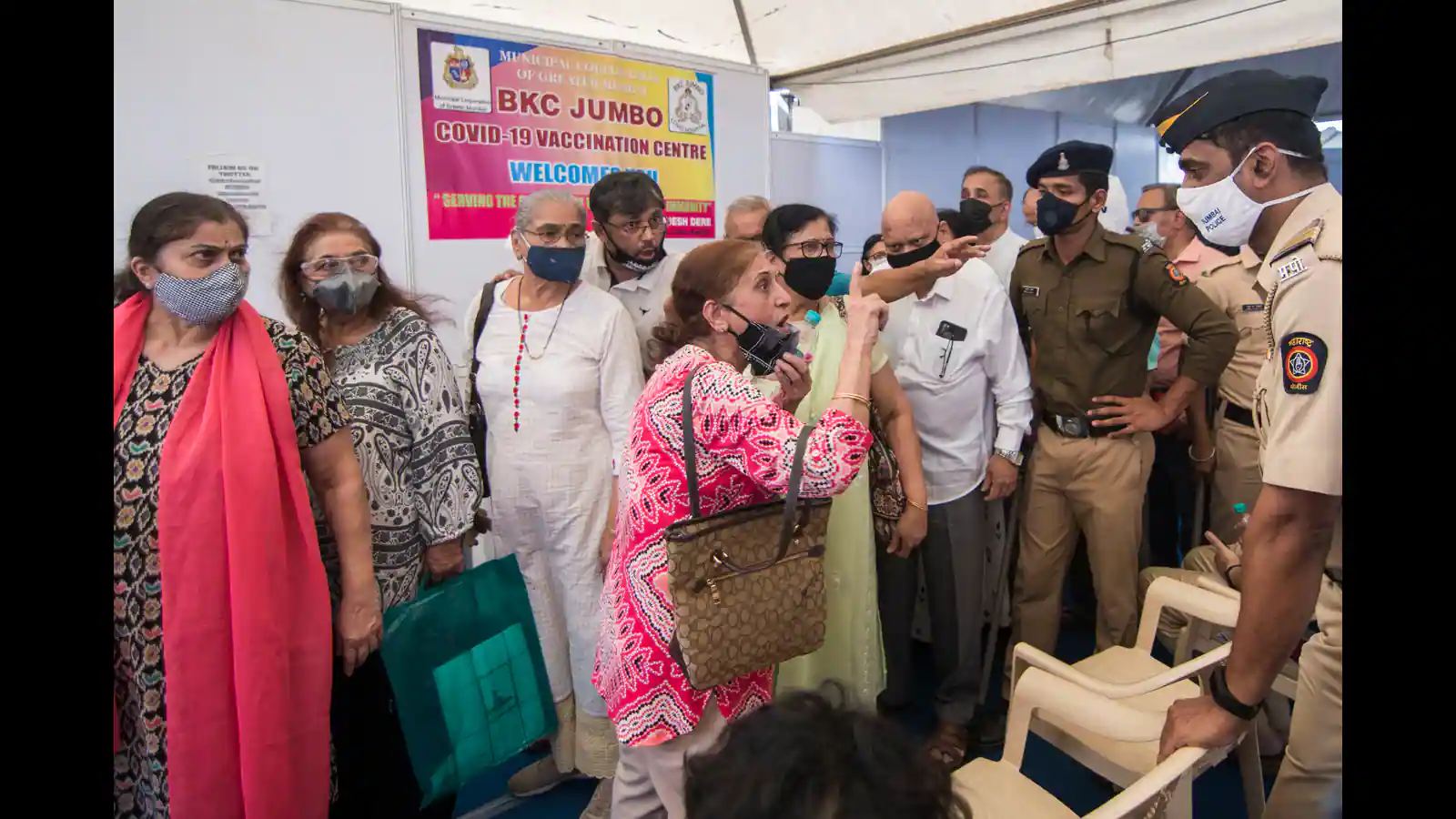Mumbai — Day two of the third phase of Covid-19 vaccination in Mumbai saw chaotic scenes similar to the first day with experts and citizens fearing that the vaccination centres may become “superspreader venues”, where one person infected with the coronavirus transmits it to several other people.
In Bhiwandi, a 45-year-old private health worker, Sukhdev Kirdat, died after receiving his second vaccine dose, officials said. He fell unconscious 20 minutes after he got the jab, after which he was rushed to another hospital and declared dead by the doctors. Officials from the Bhiwandi Nizampur City Municipal Corporation (BNCMC) said the cause of death can be ascertained only after the post mortem report is acquired. “When he took the first dose he was completely fine, ” said KR Kharat, medical health officer, BNCMC,
Meanwhile, technical glitches on the centralised CoWIN app, crowding due to inadequate seating arrangements turned vaccination centres into battlegrounds as senior citizens and those above 45 years of age with comorbidities jostled with each other just to get registered, said citizens. Civic officials criticised the Central government for a delay in issuing guidelines and not providing “breathing space”.
However, on Tuesday, 6,863 citizens above the age of 60 and above 45 years with comorbidities got their vaccine shots, a 246% jump from the 1,982 vaccinated on Monday, official data stated.
Also, on Tuesday, 25 centres, including three private ones, were activated, up from the eight on Monday. A total of 713 of the 6,863 were vaccinated at the three private centres.
According to civic officials, by around 1pm, the CoWIN portal started functioning properly, post which crowds dwindled.
Dr Neelam Andrade, dean, NESCO Covid Centre, said “The CoWIN portal had crashed or we can say it was taking time to load. But we are making all arrangements from our end to ensure no crowding. We also started manually registering those who had done so online and were scheduled appointments. The problem was with those who were walk-in beneficiaries. We cannot manually register them, considering they had not registered online nor can we register them on the spot as the portal had technical glitches.”
Dr Andrade added, “We are making all possible arrangements, and Tuesday was much better than Monday. At the same time, citizens should also ensure they follow all Covid-19 norms.’
On Tuesday, a video from the Bandra-Kurla Complex (BKC) jumbo vaccination centre, showing crowding, was being circulated on social media. Even this was due to the portal having technical glitches. Dr Rajesh Dere, dean, BKC vaccination centre, said, “By afternoon, all the crowds were managed and the vaccination was streamlined. In the morning, there was little problem considering the portal had crashed and we also appealed to citizens to act responsibly.
The BMC has maintained that it is following up with the Central government on fixing glitches on the portal, owing to which there was crowding at vaccination centres. A dean from a civic hospital said, “Lakhs or crores of citizens are logging in at the same time in the portal, owing to which there may be glitches, but until these glitches are resolved, the government should stop walk-in vaccination. Walk-ins add to the crowds at vaccination centres, leading to chaos.”
Ruben Mascarenhas, an Andheri residentn said, “I had visited the NESCO jumbo centre on Tuesday to get my parents vaccinated, but had to return home without getting it done. The portal had crashed and there was total chaos and crowding.”
Meanwhile, on Tuesday, Mumbai reported 849 new cases and two new deaths, taking the tally to 327,621 and toll to 11,481. The city’s recoveries’ tally stands at 307,052, followed by 8,217 active infections.
(with inputs from Rupsa Chakraborty)

